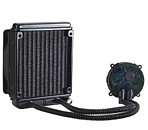Monday, March 11th 2013

Asetek Sues Cooler Master Over Multiple Patent Infringements
Asetek, which manufactures closed-loop liquid cooling solutions that are re-branded by several companies, filed a patent-infringement lawsuit against Cooler Master alleging infringement of multiple patents held by Asetek. Cooler Master's recently launched Seidon line of closed-loop liquid CPU coolers are points of contention for Asetek, as it claims the products infringe upon patent numbers 8,240,362 and 8,245,764, held by the company.
Seidon 120M and 240M may have been launched late January 2013, but had been pictured much earlier, in September. Ahead of its launch, Asetek claims it had contacted Cooler Master with a cease-and-desist order, but it claims the latter didn't respond satisfactorily, going ahead with the launch. The case (Civil Action No. 3:13-cv-00457-JSC) will now be heard by a US Court. Cooler Master's defense could stress on the point the essential design of a CPU liquid cooler hasn't changed for decades. Other liquid cooling makers, which aren't particularly as big as Asetek (which sells liquid cooling solutions to even the server and defense industries), will be closely following the case.
Source:
eTeknix
Seidon 120M and 240M may have been launched late January 2013, but had been pictured much earlier, in September. Ahead of its launch, Asetek claims it had contacted Cooler Master with a cease-and-desist order, but it claims the latter didn't respond satisfactorily, going ahead with the launch. The case (Civil Action No. 3:13-cv-00457-JSC) will now be heard by a US Court. Cooler Master's defense could stress on the point the essential design of a CPU liquid cooler hasn't changed for decades. Other liquid cooling makers, which aren't particularly as big as Asetek (which sells liquid cooling solutions to even the server and defense industries), will be closely following the case.

32 Comments on Asetek Sues Cooler Master Over Multiple Patent Infringements
With a little twist.....
In some infringement cases its still profitable even after the litigation costs and fine, to sell a product to consumers. With CLCs being the new tit and arse for 13 year old PC enthusiasts, Cooler Master may still come out ahead financially after the dust settles. No one ever lost money under estimating the technical intelligence of consumers.
Edit: The closest I could find from Koolance from 2003 was the Exos. Not even close to a pre-filled, closed loop system, with a pump/block combo.People need to realize that the patent isn't for closed loop coolers, they are actually for the pump block combo. And to show how laughably long it took for the patent to go through the original drawing in the patent show socket 478 retention style.
Truly an engineering marvel.
You wouldn't think "we took CDs and increased the data density" was a great innovation, yet the DVD is patented and anyone that uses it has to pay licensing fees to the companies that figured it out, and when someone did the same thing over again they got to patent it and charge licensing fees for Blu-Ray/HD-DVD.
If Asteks design was so unique it wouldn't have been so easily copied.
I cannot find a release date, but take a look at the 109-LC1-003
On a side note, I have one of those in my 775 rig. The thing is ginormous:
The problem is that with the patent system we impede progress by creating monopolies that last for far too long. And while in this case it seems that there is no case of prior art, generally speaking too many patents are awarded for which there is an obvious case of prior art or no real innovation.
Imo patents should grant much shorter periods of exclusive rights, and they should be dealt with (hugely) more quickly by the patent office. In addition, there should be stricter grounds on what they can be given for. I don't think that in this age of information availability that would be too hard to do.
The only other nation that is worth comparing to is China which has way more problems than the US ever did.